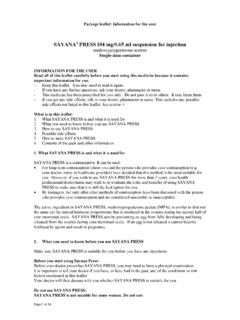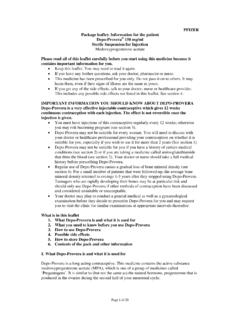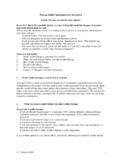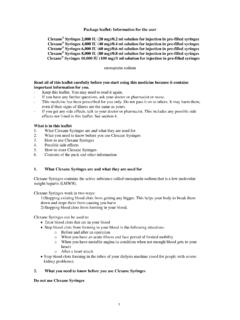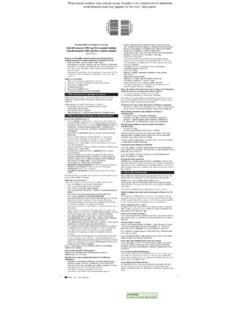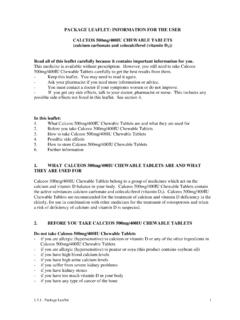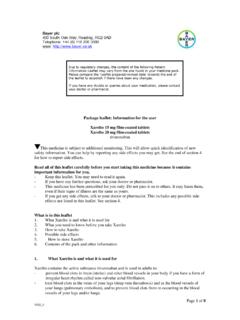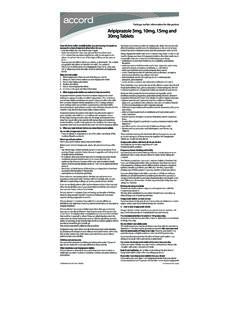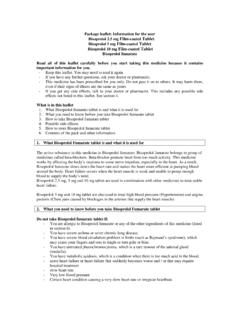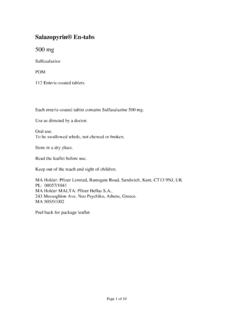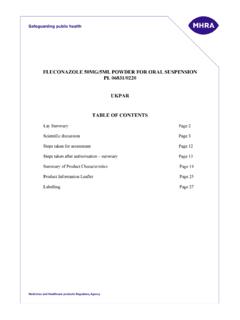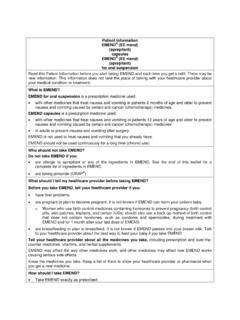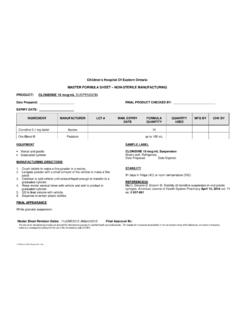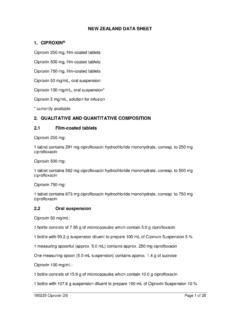Transcription of Package leaflet: Information for the user …
1 Package leaflet : Information for the user DENZAPINE 50 mg/ml oral suspension Clozapine The use of Denzapine is restricted to those patients registered with the Denzapine Monitoring Service. Read all of this leaflet carefully before you start taking this medicine because it contains important Information for you. -Keep this leaflet . You may need to read it again. -If you have any further questions, ask your doctor or pharmacist. -This medicine has been prescribed for you only. Do not pass it on to others. It may harm them, even if their signs of illness are the same as yours. -If you get any side effects, talk to your doctor or pharmacist. This includes possible side effects not listed in this leaflet . See section 4. What is in this leaflet 1. What Denzapine is and what it is used for 2. What you need to know before you take Denzapine 3.
2 How to take Denzapine 4. Possible side effects 5. How to store Denzapine 6. Contents of the pack and other Information 1. What Denzapine is and what it is used for Denzapine contains the active substance clozapine, which belongs to a group of medicines called atypical antipsychotics. Antipsychotics are mainly used to treat schizophrenia. Schizophrenia is a psychiatric disorder that affects the way a person thinks and behaves. Denzapine is used: - to treat schizophrenia when at least two other antipsychotic medicines, including one of the newer atypical antipsychotics, have not worked or have caused severe side effects - to treat psychotic disorders occurring in patients with Parkinson s disease, when standard treatment has failed. Denzapine is available only with a doctor s prescription.
3 Ask your doctor if you have any questions about why this medicine has been prescribed for you. 2. What you need to know before you take Denzapine Denzapine must not be given to anyone who is unconscious or in a coma. Do not take Denzapine: - ifyou are allergic to clozapine or to any of the other ingredients of this medicine (listed in section 6). It is important to tell your doctor if you think you have ever had an allergic reaction to any of these ingredients. Symptoms of an allergic reaction can include: - swelling of the face and mouth - itchy skin rashes or hives - difficulty breathing - faintness. - if you have been told by your doctor that you have an intolerance to some sugars, contact your doctor before taking this medicinal product - if you are unable to undergo regular blood tests - if you have a low number of white cells in the blood (leucopenia/granulocytopenia/agranulocyt osis) especially if this was caused by medicines.
4 This does not apply if you have had low white blood cell count caused by previous chemotherapy. - if you are receiving treatment with other medicines that can cause a fall in the number of white blood cells -if you are being treated or have been treated with long-acting depot injections of antipsychotics - if you have suffered from a very low white blood cell count (agranulocytosis) caused by previous treatment with clozapine. Do not take Denzapine if you have any of the following diseases: - Disorders of the bone marrow (when the bone marrow does not make enough blood cells) or have ever suffered from bone marrow disease - Uncontrolled epilepsy (fits or seizures) - Acute mental illness caused by alcohol, medicines or other substances ( narcotics) - Poisoning caused by other medicines - Circulatory collapse (a very pronounced fall in the blood pressure that may lead to unconsciousness) - Disorders affecting the brain that can lead to severe drowsiness, reduced consciousness or unconsciousness - Severe kidney disease - Heart disease (such as myocarditis (inflammation of heart muscle), pericarditis or cardiomyopathy (weakness of heart muscle)) - Active liver disease with jaundice (yellow colouration of the skin and eyes)
5 , feeling sick and loss of appetite - Liver failure (very serious liver disease) or any other severe liver disease - Paralytic ileus (a disorder of the small intestine) - If you use any medicine that stops your bone marrow from working properly. Warnings and precautions The safety measures mentioned in this section are very important. You must comply with them to minimise the risk of serious life-threatening side to your doctor or pharmacist before taking Denzapine if you have or have had any medical conditions or illnesses, especially the following: - Low number of white blood cells (leucopenia, neutropenia, granulocytopenia, agranulocytosis) - High number of a certain type of white blood cells called eosinophil granulocytes (eosinophilia) - Low number of platelets in the blood (thrombocytopenia) - Pericarditis or pericardial effusion (inflammation of the membranes around the heart) - If you have had a heart disease or family history of abnormal conduction in the heart called prolongation of the QT interval -Orthostatic hypotension (a fall in the blood pressure on standing up) - Epilepsy or fits, even if they are well controlled - Any heart, kidney, or liver disease - Enlargement of the prostate or difficulty urinating - Glaucoma (raised pressure in the eye)
6 -Severe or chronic constipation or if you are taking medicines which cause constipation (such as anticholinergics) - Paralytic ileus, disease of the large bowel or operations on the abdomen -Diabetes. Increased blood sugar levels have occurred in patients with or without diabetes mellitus in their medical history (see section 4). - Stroke (risk factors of stroke smoking, diabetes and high blood pressure) - If you or someone else in your family has a history of blood clots, as medicines like these have been associated with formation of blood clots. If you are not mobile you are at increased risk of developing blood clots while taking Denzapine. Talk to your doctor or pharmacist immediately - if you experience an elevated temperature (fever). This may be caused by Neuroleptic Malignant Syndrome - a serious reaction to some anti-psychotic medicines.
7 Symptoms include a sudden increase in body temperature, sweating, a fast heart beat, muscle stiffness and a fluctuating blood pressure. It can lead to coma. Stop taking Denzapine immediately if your doctor or pharmacist tells you. -if you get signs of a cold, fever, flu-like symptoms, sore throat or any other infection. You will have to have an urgent blood test to check if your symptoms are related to your medicine. -if you have fast and irregular heart beat, even when you are at rest, palpitations, breathing problems, chest pain or unexplained tiredness. Your doctor will need to check your heart and if necessary refer you to a cardiologist immediately. -if you experience nausea (feeling sick), vomiting (being sick) and/or loss of appetite. Your doctor will need to check your liver. -if you have severe constipation, abdominal pain, abdominal tenderness, fever, bloating and/or bloody diarrhoea.
8 Your doctor will have to treat this in order to avoid further complications. Tell your doctor if you are taking any other antipsychotic medicines (see section Taking other medicines below). Tell your doctor if you are taking any other medicines that are known to affect the heart. Medical check-ups and blood tests Denzapine may lower the number of your white blood cells, making you more prone to infections. Before and during your treatment with Denzapine, your doctor will monitor your blood count closely to make sure that the number of your white blood cells do not fall under a certain level. Tell your doctor immediately if you develop any signs of infection, such as fever, sore throat or flu-like symptoms. Your doctor will tell you exactly when and where to have the tests. Denzapine may only be taken if you have a normal blood count.
9 Denzapine can cause agranulocytosis. In this condition, the number of white blood cells (which are necessary to fight infection) is too low. If this occurs, you are at risk of suffering infections which may be life-threatening. Warning signs include flu-like symptoms, a sore throat or fever. If you develop these or any other signs suggestive of infection, you must contact your doctor immediately. There is no way of knowing who is at risk of developing agranulocytosis. Deaths have occurred in severe cases of agranulocytosis, although with regular blood tests, agranulocytosis can be detected early. If Denzapine is stopped as soon as a problem is detected, the white blood cell numbers should return to normal. You must understand the importance of regular blood tests by your doctor while taking Denzapine.
10 After starting treatment with Denzapine, you will have a blood test once a week for the first 18 weeks. The risk of agranulocytosis is highest in this period. For the rest of the first year of treatment, blood tests will be performed every 2 weeks. After the first year, tests will be performed every 4 weeks for as long as you continue to take Denzapine. Tests will also be performed for one month after stopping the medicine. These tests will tell the doctor if there is any problem with the number of white cells in your blood. There are some situations where you may need to have blood tests more often ( twice a week). Your doctor will talk to you about this. If the number of your white blood cells falls below a critical level, Denzapine must be stopped immediately and you must never take any medicines containing clozapine again.
